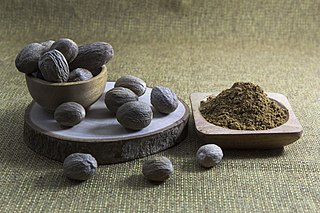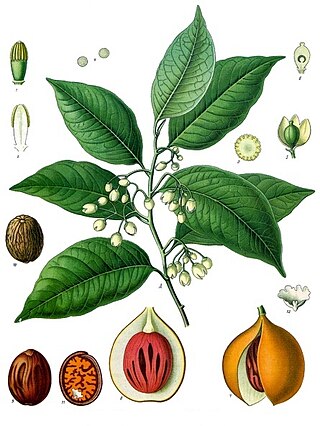
The Himalayas, or Himalaya, is a mountain range separating the plains of the Indian subcontinent from the Tibetan Plateau. The range has some of the planet's highest peaks, including the very highest, Mount Everest, which lies on the border of China and Nepal. Over 100 peaks exceeding 7,200 m (23,600 ft) in elevation lie in the Himalayas. By contrast, the highest peak outside Asia is 6,961 m (22,838 ft) tall.

Nutmeg is the seed or ground spice of several tree species of the genus Myristica; fragrant nutmeg or true nutmeg is a dark-leaved evergreen tree cultivated for two spices derived from its fruit: nutmeg, from its seed, and mace, from the seed covering. It is also a commercial source of nutmeg essential oil and nutmeg butter. Indonesia is the main producer of nutmeg and mace, and the true nutmeg tree is native to its islands.

Petasites is a genus of flowering plants in the sunflower family, Asteraceae, that are commonly referred to as butterburs and coltsfoots. They are perennial plants with thick, creeping underground rhizomes and large rhubarb-like leaves during the growing season. Most species are native to Asia or southern Europe.

Osmanthus fragrans, variously known as sweet osmanthus, sweet olive, tea olive, and fragrant olive, is a species native to Asia from the Himalayas through South China to Taiwan, southern Japan and Southeast Asia as far south as Cambodia and Thailand.

Osmanthus is a genus of about 30 species of flowering plants in the family Oleaceae. Most of the species are native to eastern Asia ,and was originally found in the middle east of the Himalayas, with a few species from the Caucasus, New Caledonia, and Sumatra. Osmanthus has been known in China since ancient times with the earliest writings coming from the Warring States period; the book Sea and Mountain. South Mountain states: "Zhaoyao Mountain had a lot of Osmanthus".

The Myristicaceae are a family of flowering plants native to Africa, Asia, Pacific islands, and the Americas and has been recognized by most taxonomists. It is sometimes called the "nutmeg family", after its most famous member, Myristica fragrans, the source of the spices nutmeg and mace. The best known genera are Myristica in Asia and Virola in the Neotropics.

Auli is in Chamoli district in the Himalayan mountains of Uttarakhand, India. Auli, also known as Auli Bugyal, in Garhwali, which means "meadow", is located at an elevation of 2,800 metres (9,200 ft) above sea level. Between June and October, the valley has one of highest numbers of flower species found anywhere in the world, with 520 species of high altitude plants, 498 of which are flowering plants with significant populations of endangered species.

Mount Harriet National Park, officially renamed as Mount Manipur National Park, is a national park located in the Andaman and Nicobar Islands union territory of India. The park, established in 1969, covers about 4.62 km2 (18.00 mi2). Mount Manipur, which is a part of the park, is the third-highest peak in the Andaman and Nicobar archipelago next to Saddle Peak in North Andaman and Mount Thullier in Great Nicobar.

The tembusu is a large evergreen tree in the family Gentianaceae, native to Southeast Asia. It is the Malay name for Cyrtophyllum fragrans.

Heteropanax is a genus of flowering plants in the family Araliaceae. They are native to Asia.
Heteropanax nitentifolius is a species of plant in the family Araliaceae. It is endemic to China.
Heteropanax yunnanensis is a species of plant in the family Araliaceae. It is endemic to China.

Dracaena fragrans, is a flowering plant species that is native throughout tropical Africa, from Sudan south to Mozambique, west to Côte d'Ivoire and southwest to Angola, growing in upland regions at 600–2,250 m (1,970–7,380 ft) altitude. It is also known as striped dracaena, compact dracaena, and corn plant.

Primula fragrans, synonym Dodecatheon redolens, has the common name scented shooting star. It is a species of flowering plant in the primrose family.

Myristica fragrans is an evergreen tree indigenous to the Maluku Islands of Indonesia. It is important as the main source of the spices nutmeg and mace. It is widely grown across the tropics including Guangdong and Yunnan in China, Taiwan, Indonesia, Malaysia, Grenada in the Caribbean, Kerala in India, Sri Lanka and South America.

Chonemorpha is a genus that consists of large evergreen vigorous woody vines with milky sap from India, Sri Lanka, to Southeast Asia, the Philippines and South China. Growing dormant in sub-tropical and tropical climates and usually losing leaves if temperature gets below 60F. The plants have pubescent to almost tomentose branches, leaves and inflorescences. Large, corrugated, ovate leaves to 40 cm long, deep glossy green, opposite, pale and hairy beneath. Very fragrant, funnel-shaped, showy flowers to 8 cm across with long-peduncled and terminal cymes. Corolla cream with yellow center. Disk cupular with many seeds, ovate-shaped, compressed, with scanty endosperm, with a tuft of hairs at one end, dark brown. The plant is widely grown as a fence cover.
- Chonemorpha assamensisFurtado - Assam, Bangladesh
- Chonemorpha eriostylisPit. in H.Lecomte - Yunnan, Guangdong, Vietnam
- Chonemorpha floccosaTsiang & P.T.Li - Guangxi
- Chonemorpha fragrans(Moon) Alston - China, Indian Subcontinent, Indochina, Malaysia, Indonesia, Philippines
- Chonemorpha megacalyxPierre ex Spire - Yunnan, Laos, Thailand
- Chonemorpha mollisMiq. - Java
- Chonemorpha parvifloraTsiang & P.T.Li - Yunnan, Guangxi
- Chonemorpha pedicellataRao - W Himalayas
- Chonemorpha splendensChun & Tsiang - Yunnan, Hainan
- Chonemorpha verrucosa(Blume) D.J.Middleton - Guangdong, Hainan, Yunnan, Bhutan, Assam, Bangladesh, Indonesia, Malaysia, Indochina
Tillandsia fragrans, synonym Vriesea fragrans, is a species of flowering plant in the family Bromeliaceae, native to north-west South America. It was first described by Édouard André in 1888.

Callisia fragrans, is a plant species of the genus Callisia, in the family Commelinaceae.

Chonemorpha fragrans, the frangipani vine or climbing frangipani, is a plant species in the genus Chonemorpha. It is a vigorous, generally evergreen, climbing shrub producing stems 30 m (98 ft) or more long that can climb to the tops of the tallest trees in the forests of Southeast Asia. It has scented, white flowers and large shiny leaves. and it is native to China, India, Indonesia, Malaysia, Myanmar, Sri Lanka and Thailand. It is very commonly used in Ayurveda and it is also cultivated mostly worldwide in frost-free places.

Aquilegia fragrans, the fragrant columbine or sweet-scented columbine, is a species of columbine belonging to the family Ranunculaceae.
















